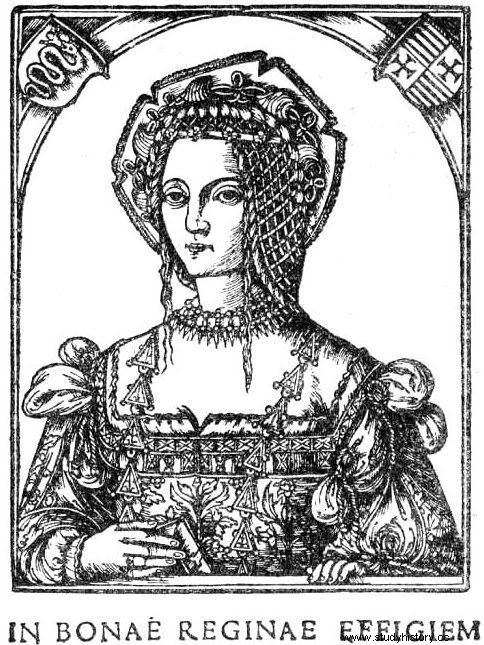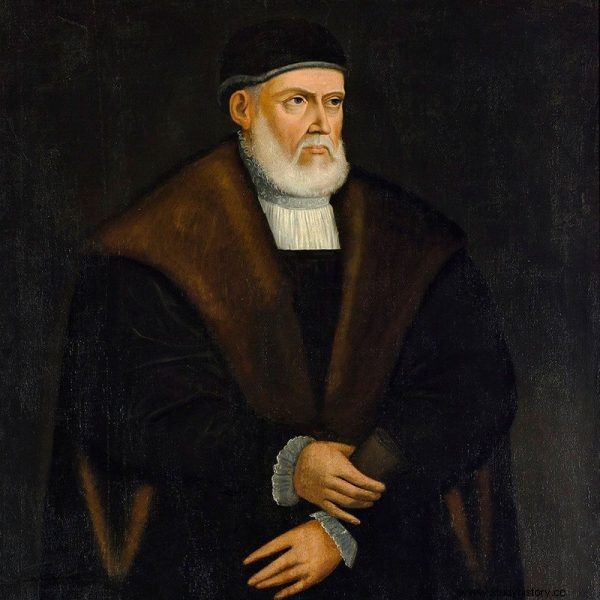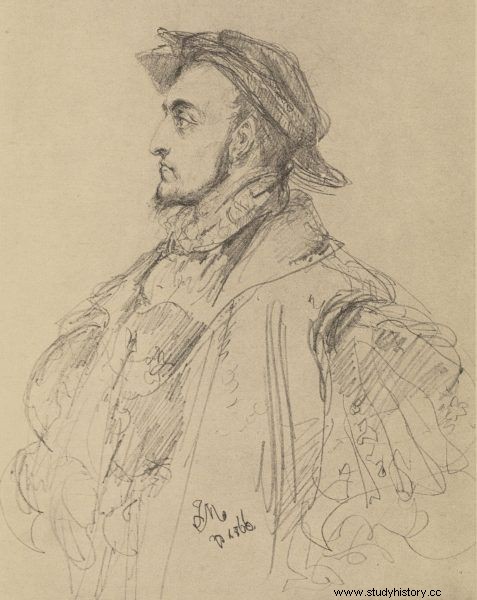Even to the king himself the idea of coronating his son, Sigismund Augustus, while he was still alive, seemed absurd. The subjects also did not want to hear about any vivente rege elections. Who, then, pushed the whole thing? And what for?
From the moment of the birth of her only son, Zygmunt August, Queen Bona concentrated all her efforts on ensuring that the boy would succeed his father, Zygmunt Jagiellończyk. The Jagiellonians did not have hereditary rights to the Polish throne and although until now royal sons always replaced deceased monarchs, nothing could be taken for granted in the case of the two Sigismunds.
Bona's husband increasingly deserved the nickname "the old man". At the time of August's birth, he was fifty-three years old. Even in her wildest dreams, Bona did not expect to live to see her son come of age. But no one could have foreseen what would happen if the old king died, leaving only a ten, five, or even three-year-old child behind. Even more so, no one could guarantee Bona that after Zygmunt left, she would retain any influence on her son's upbringing.
In Poland and abroad, there were many "kind" guardians who would tear the baby from his mother's hands without batting an eye, just to turn the scales of the political game to their side. This was dreamed about by the Prussian prince Albrecht, emboldened by the famous tribute of 1525. The Habsburgs also sharpened their teeth for the guardianship of Augustus. After them, Bona - enemy number one of the German dynasty - could expect the worst. The rulers of the civilized world long ago stopped treating her as a full-fledged monarch. In violation of international law, they arrested her deputies, opened diplomatic correspondence, and even confiscated fruit, textiles and jewelry that the Queen bought in Italy and brought to Poland through the lands of the Empire.

Bona Sforza on a woodcut from 1521
Bona could not wait for her husband to die. She had to act immediately. Even if it were to violate centuries-old traditions and legal principles underlying the Polish-Lithuanian state.
Unexpected Adversary
The Queen understood perfectly well that the only guarantor of the Jagiellonian power over the Vistula was their hereditary rights to Lithuania. So she wanted to be sure that after her husband's death, at least Lithuanians would choose the youngest Jagiellon as their ruler without any problems. She met resistance from a rather unexpected side. Kłody was thrown at her feet by himself ... Zygmunt Stary, who should care most about his son's rights.
Meanwhile, the monarch stubbornly hindered his wife's departure to Lithuania. He argued that young royal children should not be left unattended, let alone risk a long trip to Vilnius. In addition, he remained deaf to Bona's whispers about securing the throne to Augustus. In this situation, the queen resorted to a trick:she allied herself with one of the influential magnates who befriended Zygmunt. It was he who was to submit Bona's design to the king, presenting him, of course, as his own and not from a politicized woman.
The ruler chose the richest man in Lithuania, Olbracht Gasztold, as her ally. Fortunately, tangible evidence of this court plot has been preserved. After a few years, Gasztołd fell into conflict with the queen and began to draw her old, allegedly never fully paid favors in her letters. "I took up the matter with all zeal and submitted this idea to our lord, who [so far] had for some reason hidden the idea of the good of the only child deep in his heart," he wrote about the efforts made to secure the throne of Sigismund Augustus. “It was only when he heard my opinion about it that he began to speak openly about this case and wish to be proved as soon as possible. As for me, I began to make efforts among my brothers and friends, urging them to unanimously consent to it. "
The plot paid off. Although Bona had to arrange for Gasztołd to be promoted to the Grand Chancellor of Lithuania, and his fifteen-year-old son to be nominated for the voivode of Novgorod, she achieved her goal. On December 4, 1522, only three-year-old Sigismund Augustus was unanimously recognized by Lithuanian dignitaries as Grand Duke in the event of the death of Sigismund the Old. On the same day, members of the princely council swore allegiance to him.
In order to avoid the bizarre ceremony in which the lisping toddler would receive the tribute of the magnates, the still living father acted in place of his son. The ceremony was binding anyway, and most of all - it lulled Bona's fears for several years. However, it did not change its main goals. The Queen focused all her efforts on giving her son the best possible start in the royal life.

Portrait of Zygmunt Stary, most probably by Marcin Ostrowski.
She was alone in her efforts again. Zygmunt the Old, as always short-sighted and devoid of ambition, claimed that August would be completely satisfied with the Crown and Lithuania. Although Bona tried to influence him, the king's susceptibility to the advice of friends, which she used in 1522, also often acted to her detriment. Despite the passage of time, Bona's ambitions continued to clash with the well-established interests of the royal dignitaries.
Krzysztof Szydłowiecki, the corrupt Grand Chancellor of the Crown, walking on the belt of the Habsburgs and happily rendering his services to the Hohenzollerns, was particularly often on her way. He was a cunning and talented man, but in terms of ethics - absolute zero. He was ready to take money from anyone, and then spoke proudly about the accepted bribes. He himself admitted that the Habsburgs paid him eighty thousand ducats. He got another five from the French. He even tried to stretch the king of England for a larger amount, but this one did not see any sense in corrupting the Poles.
No wonder that having such a head of diplomacy, Zygmunt blocked Bona's attempts to unite Western Pomerania with Poland. It was not in the interest of the Brandenburgers, after all. No wonder the ruler resisted another suggestion from Bona in 1522.

Krzysztof Szydłowiecki on the lithography of W. Gerson
Filled with the Lithuanian success, the monarch suggested to her husband that he should take advantage of the difficult situation in Hungary and grant the Duchy of Głogów to Zygmunt August. It could be done - the old king had certain rights to Głogów as his former ruler, from the times before he sat on the Krakow throne. The monarch replied with sincere indignation that it was simply not appropriate to take similar steps. And that "our little son does not need anything like that". As a result, Poland will have to wait until 1945 for the annexation of Silesia and the rest of Pomerania. Also in Mazovia, where the native branch of the Piast dynasty had just died out, the king's indolence made it impossible to award this valuable province to the heir to the throne.
"His Majesty, our lord and spouse, our beloved fell into a fever"
Little Augustus still did not have even a scrap of his own land, but only the uncertain promise of Lithuanian lords that when the time came, they would elect him ruler. Meanwhile, Zygmunt Stary was just reaching his sixties, and his health - getting weaker every year - finally refused to obey.
In the fall of 1528, increasing rheumatic pains chained him to bed for a month. He had barely begun to recover when another illness knocked him off his feet. In May, he began to suffer from a high, chronic fever, the source of which the doctors were unable to pinpoint. The monarch, soaked in sweat, trembling and wrapped in quilts, was getting weaker and weaker day by day. He also quickly lost touch with reality and any influence on state affairs. Rumors about the critical condition of the king spread throughout Poland. Within a week, panting messengers delivered them to the main courts of Europe.

Medal of Sigismund the Old from 1526
Among the raging speculations there was also one that the king was already dead. here and there preparations for the funeral began. Finally, the rumors were cut short by Bona herself by formulating a special letter to the primate, which was then to be forwarded to senators and members of the royal council. Monarchini explained:
We would like to write about happier things these days, but whatever God and nature do, we must, albeit with regret, accept and report Your Grace. We do not want to hide from you that His Majesty, our beloved spouse, on the 30th of last month, had a severe fever, which in the past days troubled him and still troubles him.
She went on to write about desperate attempts to find an effective medicine and about the hope placed in God's help. Finally, however, it was declared that the queen expected the worst. She was already asking senators for help in arranging political matters after Sigismund's death in a way "most beneficial for us, our enlightened children, as well as for this kingdom and our countries".
The dignitaries did begin to arrange matters. But they didn't necessarily do it the way the queen wanted. The magnates, bribed by the Habsburgs, had already conspired to remove the widow from any influence. Albrecht Hohenzollern, without waiting for the death of his uncle, announced a war emergency and, together with relatives from the overgrown dynasty, formed a plot to impose German regency on Poland. Prussian troops were on the borders of the Crown when the king unexpectedly recovered in an almost miraculous way.
Bona had aged at least ten years in those few weeks and turned from a calculated stoic into a bundle of nerves. She was not going to let a similar situation happen again in the future. She focused all her efforts on a risky goal:to elect Sigismund Augustus as king while her father was still alive.
Two monarchs in one country
No one in the history of Poland has succeeded in a similar feat, but Bona ignored the arguments of the skeptics. She personally went to Vilnius to negotiate with the grand-ducal council. She found herself in a completely unknown and inaccessible country. In a place whose culture she did not understand and whose harsh climate terrified her. In a letter to Alfons d'Este, she stubbornly persuaded the addressee that it was not a country which the harsh nature "made empty, sterile and devoid of all charm, being for him a stepmother rather than a mother". She was actually trying to convince herself of it.

Zygmunt August in a sketch by Jan Matejko
The scale of the challenge was enormous. But Bona's determination was even greater. The Queen spent every moment exploring the secrets of Lithuanian politics. Here, power was still based on strength and deception, and the Jagiellonians enjoyed the respect of the eternal sovereigns of the wild, ruthless land. The position of the magnates was also completely different. The leaders of the most powerful Lithuanian families considered themselves lords of life and death. They treated the rest of society as well, including the nobility.
It was a system quite unlike anything Bona had ever dealt with. Despite this, she managed not only to enter the swirl of snakes, but also to win a worthy place in it. I think she even realized that she liked this kind of political model that does not account for any sign of weakness. Soon he will concentrate most of his initiatives in Lithuania.
The first success came much faster than anyone expected. Less than two years later, the Lithuanians hailed little August as their ruler. Faced with the facts, Poles had no choice. In December 1529, the parliament in Piotrków decided to elevate the nine-year-old prince to the throne, and on February 20, 1530, he was solemnly crowned vivente rege - so during the lifetime of the predecessor.
For the first time in history, Poland had two monarchs at the same time. The dumbfounded Crown Deputy Chancellor, Piotr Tomicki, reported directly to Bona:"It is difficult to describe how, contrary to expectations, the successful election of the future king was quickly and unanimously!" Bona's husband was also amazed. In letters to his wife, he expressed his deepest surprise. And perhaps misunderstanding as well. He couldn't believe that a woman could do such great things.
Source:
You can learn more about the confusing fates of Bona Sforza and Zygmunt August in Kamil Janicki's book. Ladies of the golden age (Horizon Label 2014). The article is based on the literature and materials collected by the author during the work on the book.
